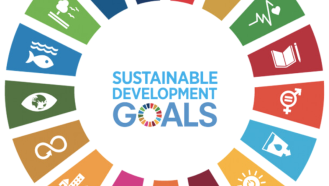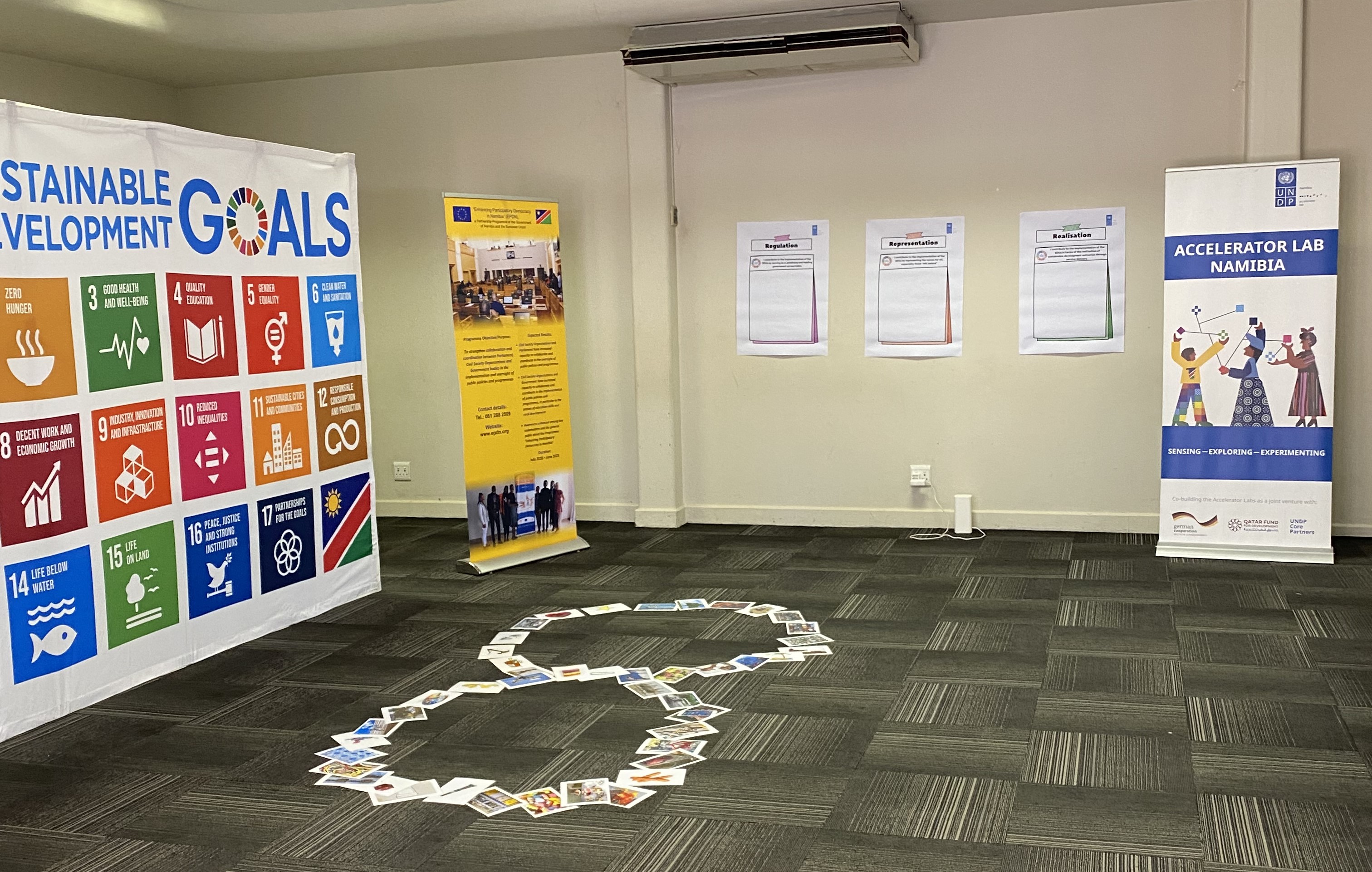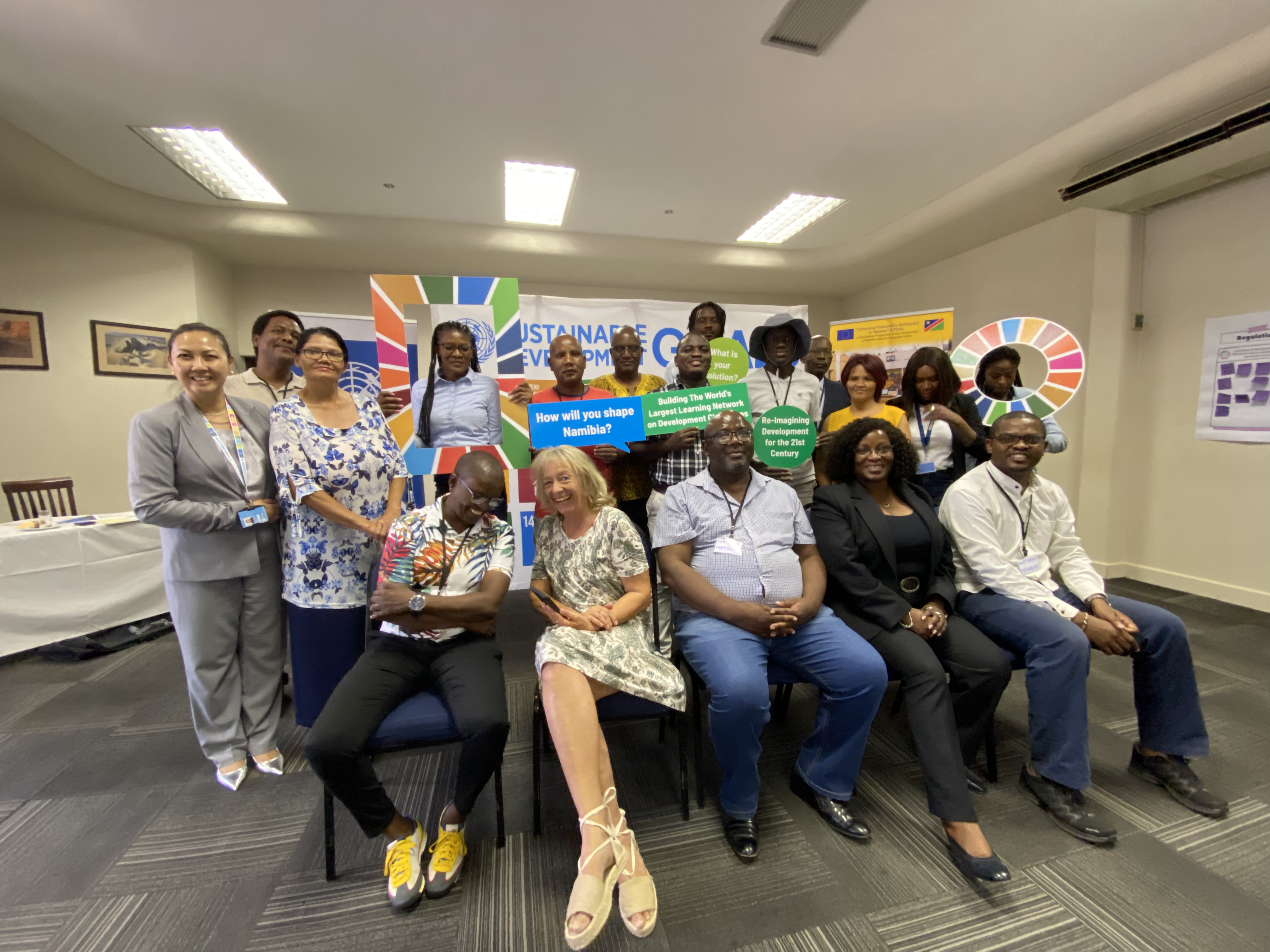Advocating Change and Leaving no-one behind: Acknowledging the contribution of Civil Society Organisations towards achieving the SDGs in Namibia
April 2, 2024
Yrika Maritz, Head of Experimentation
The Sustainable Development Goals (SDGs) symbolise the collective aspirations of humanity to create a better world for all. Achieving these goals requires the collaboration and engagement of various stakeholders, including civil society organizations. In recognition of this, the United Nations Development Programme (UNDP) Namibia Accelerator Lab and the Inclusive Governance Project Analyst, in collaboration with the Enhancing Participatory Democracy in Namibia (EPDN) Programme, organised an interactive session to introduce the contribution of civil society to the SDGs. This blog post highlights the key takeaways from the session and explores the potential of collaborative efforts in achieving the SDGs.
The Importance of Civil Society in Achieving the SDGs
Civil society organisations play a vital role in promoting human rights, advocating for social justice, and supporting sustainable development. They bring unique perspectives and expertise to the table, which can help shape policies and programs that align with the SDGs. The engagement with civil society provides opportunities to leverage their strengths, unique perspectives, and resources to achieve the SDGs.
The UNDP Namibia Accelerator Lab's interactive session aimed to facilitate a discussion on the role of civil society in achieving the SDGs. The session used a participatory approach, encouraging attendees to share their thoughts and ideas on how civil society can contribute, and equally share their data on the SDGs.
The Three Pathways to Contributing to the SDGs
The UNDP Namibia Accelerator Lab designed a collective intelligence tool to collect data and insights based on the three pathways identified in the UNDESA Report through which civil society can contribute to the SDGs: through representation, regulation, and realisation.
1. Representation: Civil society organisations can represent marginalized communities and advocate for their rights. They can amplify the voices of those who are often left behind, ensuring that their needs and concerns are taken into account in policymaking processes.
2. Regulation: Civil society organisations can play a crucial role in holding governments and private sector actors accountable for their actions. They can monitor and report on progress towards the SDGs, ensuring that commitments are met, and progress is tracked.
3. Realisation: Civil society organisations can collaborate with governments, the private sector, and communities to implement projects and programs that contribute to the SDGs. They can provide technical expertise, resources, and innovative solutions to achieve the SDGs.
Envisioning a World and a Namibia in 2030
The interactive session opened with a projective exercise, asking participants to envision a world and a Namibia in 2030 with the help of pictures that individuals were asked to select. This approach allowed attendees to think creatively and ambitiously about what could be achieved by 2030. Participants were then encouraged to share their aspirations and contributions to the SDGs, using a Liberating Structure method 1–2-4-All to foster a sense of ownership and commitment towards achieving the goals.
The session highlighted the importance of partnerships and engaging everyone in the achievement of the SDGs. It emphasized that no single organization or individual can achieve the SDGs alone; rather, it requires a collective effort from all segments of society.
A method to enhance collaboration: Liberating Structures
The UNDP Namibia Accelerator Lab used liberating structures as a methodology to create dialogue and engagement among participants. Liberating structures are a set of 33 practical and actionable micro-structures that can be used to engage people in various contexts. These structures promote participation, foster collaboration, and encourage creativity.
The use of liberating structures in the interactive session allowed participants to engage in meaningful conversations, share ideas, and build on each other's thoughts. The method created a safe space for attendees to express their opinions and engage in constructive dialogue.
Broad Takeaways
As takeaways, the short, but interactive session facilitated by the UNDP Namibia Accelerator Lab highlighted the critical role that civil society organisations play in achieving the SDGs. The three pathways to contributing to the SDGs – representation, regulation, and realisation – offer a framework for civil society organisations to engage with governments, the private sector, and communities. The session also emphasised the importance of partnerships and engaging everyone in the achievement of the SDGs and contributing towards the reporting of the SDGs at a local level through a shadow report curated by civil society to supplement the Voluntary National Review (VNR) report. It demonstrated that by working together, sharing ideas, and leveraging each other's strengths, it becomes possible to achieve the SDGs. Finally, the use of liberating structures in the session showcased the power of collaboration and participatory approaches in fostering engagement and dialogue. It emphasised that everyone has a role to play in achieving the SDGs and that by working together, we can create a better world for all. The SDGs represent a collective aspiration for a better world and achieving them requires the engagement of all segments of society.
The interactive session demonstrated the potential of collaborative efforts in achieving the SDGs. We would like to continue working with civil society organisations and engage everyone in the achievement of the SDGs, to create a brighter future for all. Do you have a contribution to make towards the achievement of the SDGs in Namibia? How can we make a more meaningful and sustainable impact together? How might we expand our work to recognise the diverse nature of civil society organisations and support them; and how do we design mutually accountable mechanisms in reaching the SDGs? Do reach out to us!

 Locations
Locations

